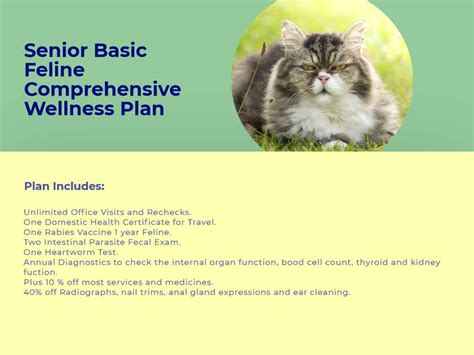As our feline companions age, their health needs change. By understanding the unique challenges senior cats face, we can provide them with the best possible care and ensure they live long, happy lives.

1. Senior Cat Health Challenges
- Arthritis: Painful inflammation of the joints, causing stiffness and difficulty moving.
- Dental disease: Tooth decay, gum disease, and infections can cause pain and discomfort.
- Kidney disease: Impaired kidney function, leading to fluid retention, lethargy, and loss of appetite.
- Hyperthyroidism: An overactive thyroid gland, causing weight loss, increased appetite, and anxiety.
- Cognitive decline: Changes in brain function, leading to confusion, disorientation, and changes in behavior.
2. Wellness Exams
Regular wellness exams are essential for detecting and managing health issues in senior cats. According to the American Veterinary Medical Association (AVMA), cats over 10 years old should have a wellness exam every 6 months.
These exams typically include:
- Physical examination: Check for lumps, bumps, and other abnormalities.
- Bloodwork: Assess organ function, blood cell counts, and hormone levels.
- Urinalysis: Evaluate kidney function and detect infections.
3. Nutrition
As cats age, their nutritional needs change. Senior cats may need:
- Reduced calorie intake: To manage weight gain, which can contribute to arthritis and other health issues.
- High-quality protein: To support muscle mass and maintain a healthy weight.
- Additional supplements: Such as glucosamine and chondroitin for joint health, and omega-3 fatty acids for coat and skin health.
4. Exercise
Regular exercise is important for maintaining senior cats’ mobility and overall health. Encourage low-impact activities such as:
- Play sessions: Using interactive toys or chasing a laser pointer.
- Walks: On a leash in a safe area.
- Cat trees: Providing vertical space for climbing and exploring.
5. Dental Care
Dental disease is a common problem in senior cats. Brush their teeth regularly and schedule professional dental cleanings to prevent pain, infections, and other health issues.
6. Grooming
Regular grooming helps keep senior cats clean and comfortable. Brush their fur to remove dead hair and mats, and trim their nails to prevent overgrowth.
7. Cognitive Stimulation
Mental stimulation is important for senior cats to prevent cognitive decline. Provide them with interactive toys, puzzle feeders, and opportunities to explore their surroundings.
8. End-of-Life Care
As senior cats approach the end of their lives, their needs will change. Ensure they are comfortable and have access to pain management, if necessary. Discuss end-of-life care options with your veterinarian to make an informed decision when the time comes.
Conclusion
By providing our senior cats with proper care and attention, we can help them live long, healthy, and happy lives. Regular wellness exams, proper nutrition, exercise, dental care, grooming, cognitive stimulation, and end-of-life care are essential components of pet wellness for senior cats.





















